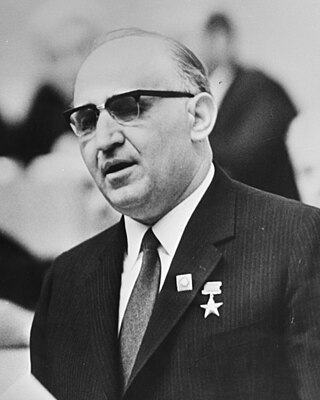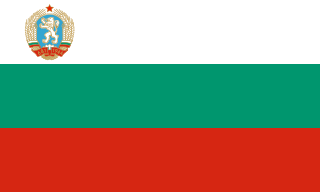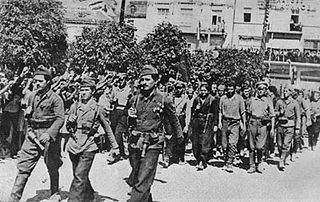
The politics of Bulgaria take place in a framework of a parliamentary representative democratic republic, whereby the prime minister is the head of government, and of a multi-party system. Executive power is exercised by the government. Legislative power is vested in both the government and the National Assembly. The Judiciary is independent of the executive and the legislature.

Goran Bregović is a recording artist from Bosnia and Herzegovina. He is one of the most internationally known modern musicians and composers of the Slavic-speaking countries in the Balkans, and is one of the few former Yugoslav musicians who has performed at major international venues such as Carnegie Hall, Royal Albert Hall and L'Olympia.
Nueva canción is a left-wing social movement and musical genre in Latin America and the Iberian peninsula, characterized by folk-inspired styles and socially committed lyrics. Nueva canción is widely recognized to have played a profound role in the pro-democracy social upheavals in Portugal, Spain and Latin America during the 1970s and 1980s, and was popular amongst socialist organizations in the region.

James Henry Miller, better known by his stage name Ewan MacColl, was a British folk singer-songwriter, folk song collector, labour activist and actor. Born in England to Scottish parents, he is known as one of the instigators of the 1960s folk revival as well as for writing such songs as "The First Time Ever I Saw Your Face" and "Dirty Old Town".

The Communist International (Comintern), also known as the Third International, was an international organization founded in 1919 that advocated world communism, and which was led and controlled by the Communist Party of the Soviet Union. The Comintern resolved at its Second Congress in 1920 to "struggle by all available means, including armed force, for the overthrow of the international bourgeoisie and the creation of an international Soviet republic as a transition stage to the complete abolition of the state". The Comintern was preceded by the dissolution of the Second International in 1916.

Todor Hristov Zhivkov was a Bulgarian communist statesman who served as the de facto leader of the People's Republic of Bulgaria (PRB) from 1954 until 1989 as General Secretary of the Bulgarian Communist Party. He was the longest-serving leader in the Eastern Bloc, the longest-serving leader within the Warsaw Pact and the longest-serving non-royal ruler in Bulgarian history.

Georgi Sedefchov Parvanov is a Bulgarian historian and politician who was President of Bulgaria from 2002 to 2012. He was elected after defeating incumbent Petar Stoyanov in the second round of the November 2001 presidential election. He took office on 22 January 2002. He was reelected in a landslide victory in 2006, becoming the first Bulgarian president to serve two terms. Parvanov supported Bulgaria's entry into NATO and the European Union.

The Bulgarian Socialist Party, also known as The Centenarian, is a centre-left, social democratic political party in Bulgaria. The BSP is a member of the Socialist International, Party of European Socialists, and Progressive Alliance. Although founded in 1990 in its modern form, it traces its political heritage back to the founding of the BRDSP in 1891. It is also Bulgaria's largest party by membership numbers.

Avraam Eliezer Benaroya was a Jewish socialist, member of the Bulgarian Social Democratic Workers' Party, later leader of the Socialist Workers' Federation in the Ottoman Empire. Benaroya played a key role in the foundation of the Socialist Worker's party of Greece in 1918, the predecessor of the Communist Party of Greece.

Avante! (Onwards!) is the official newspaper of the Portuguese Communist Party (PCP). Founded in 1931, it continues to be published to this day. The newspaper's motto is Workers of the World, Unite! and has been present in every edition of the newspaper since the very first. Its headquarters is in Lisbon.

Progg was a left-wing and anti-commercial musical movement in Sweden that began in the late 1960s and became more widespread in the 1970s. Not to be confused with the English expressions "progressive music" or "prog rock," progg is a contraction of the Swedish word for musical progressivism, progressiv musik. While there were progg bands playing progressive rock, the progg movement encompassed many different musical genres.

The People's Republic of Bulgaria, from 1990 onwards known as Republic of Bulgaria, was the official name of Bulgaria when it was a socialist republic from 1946 to 1990, ruled by the Bulgarian Communist Party (BCP) together with its coalition partner, the Bulgarian Agrarian People's Union. Bulgaria was closely allied and one of the most loyal satellite states of the Soviet Union during the Cold War, sometimes being called the 16th Soviet Republic rather than an independent country. Bulgaria was also part of Comecon as well as a member of the Warsaw Pact. The Bulgarian resistance movement during World War II deposed the Kingdom of Bulgaria administration in the Bulgarian coup d'état of 1944 which ended the country's alliance with the Axis powers and led to the People's Republic in 1946.
The history of Bulgaria from 1990 to the present is the period of Bulgarian history that begins after the fall of Communism and the transition to a market economy.

The music of the Soviet Union varied in many genres and epochs. The majority of it was considered to be part of the Russian culture, but other national cultures from the Republics of the Soviet Union made significant contributions as well. The Soviet state supported musical institutions, but also carried out content censorship. According to Lenin, "Every artist, everyone who considers himself an artist, has the right to create freely according to his ideal, independently of everything. However, we are communists and we must not stand with folded hands and let chaos develop as it pleases. We must systemically guide this process and form its result."

The 1944 Bulgarian coup d'état, also known as the 9 September coup d'état, was a coup that overthrew the government of Kingdom of Bulgaria carried out on the eve of 9 September 1944. During the People's Republic of Bulgaria it was called using the propaganda term People's Uprising of 9 September – on the grounds of the broad unrest and Socialist Revolution – as it was a turning point politically and the beginning of radical reforms towards Soviet-style socialism.
A bloc party, sometimes called a satellite party, is a political party that is a constituent member of an electoral bloc. However, the term also has a more specific meaning, referring to non-ruling but legal political parties in a one-party state as auxiliary parties and members of a ruling coalition, differing such governments from pure one-party states such as Nazi Germany and the Soviet Union, although such minor parties rarely if ever constitute opposition parties or alternative sources of power. Other authoritarian regimes may also have multiple political parties which are nominally independent in order to give the appearance of political pluralism, but support or act in de facto cooperation with the government or ruling party.

The World Federation of Democratic Youth (WFDY) is an international youth organization, and has historically characterized itself as left-wing and anti-imperialist. WFDY was founded in London, United Kingdom in 1945 as a broad international youth movement, organized in the context of the end of World War II with the aim of uniting youth from the Allies behind an anti-fascist platform that was broadly pro-peace, anti-nuclear war, expressing friendship between youth of the capitalist and socialist nations. The WFDY Headquarters are in Budapest, Hungary. The main event of WFDY is the World Festival of Youth and Students. The last festival was held in Sochi, Russia, in October 2017. It was one of the first organizations granted general consultative status with the United Nations Economic and Social Council.

A popular front is "any coalition of working-class and middle-class parties", including liberal and social democratic ones, "united for the defense of democratic forms" against "a presumed Fascist assault". More generally, it is "a coalition especially of leftist political parties against a common opponent".
The history and development of jazz in Bulgaria was significantly influenced by the cultural and political changes in the country during the 20th century, which led to the emergence of a genre blending western jazz styles with Bulgarian folk music influences.
People's democracy is a theoretical concept within Marxism–Leninism and a form of government which developed after World War II and allows in theory for a multi-class and multi-party democracy on the pathway to socialism. People's democracy was established in a number of European and Asian countries as a result of the people's democratic revolutions of the 1940s.














